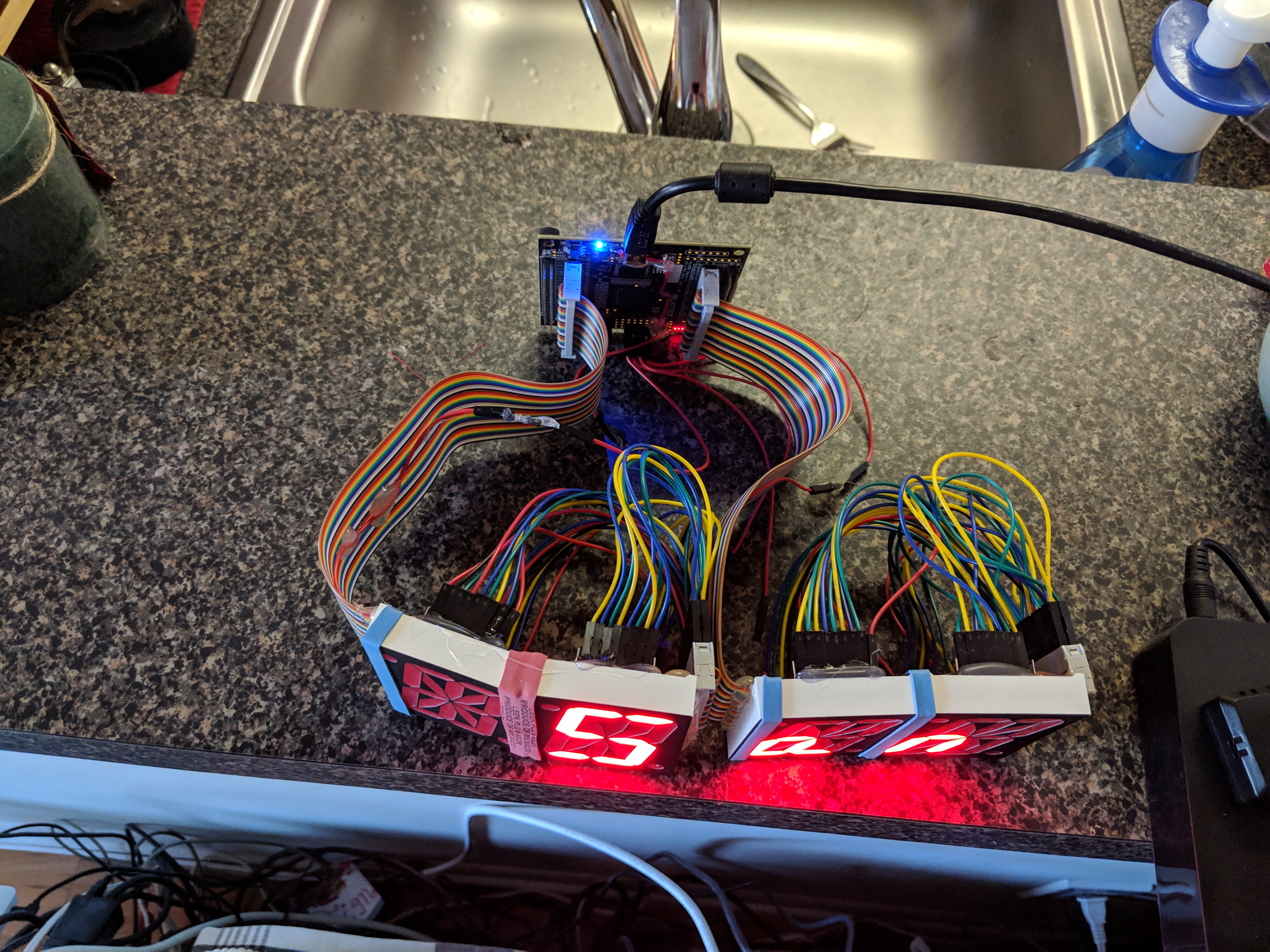|
1 2 3 4 5 6 7 8 9 10 11 12 13 14 15 16 17 18 19 20 21 22 23 24 25 26 27 28 |
#ifndef thing_H #define thing_H #define DEVICE_NAME "thing" #define DRIVER_NAME "thing" struct context { uint card; // cards probed struct pci_dev *pdev; // pci dev void *buf1; // DMA download data dma_addr_t buf1_dma_handle; // physical address of the DMA download region struct cdev cdev; // char dev uint opens; // XXX do I really need to know this? uint32_t pci_mem_start; // pci config space uint32_t pci_mem_length; // pci config space void __iomem *bar0_base_addr; // the BARs were mapped here int irq; // our IRQ }; static int thing_probe(struct pci_dev *, const struct pci_device_id *); static void thing_remove(struct pci_dev *); static int fops_open (struct inode *, struct file *); static ssize_t fops_read(struct file *, char __user *, size_t, loff_t *); static ssize_t fops_write(struct file *, const char __user *, size_t, loff_t *); static irqreturn_t thing_isr(int, void *); static int fops_release (struct inode *, struct file *); #endif //thing_H |
|
1 2 3 4 5 6 7 8 9 10 11 12 13 14 15 16 17 18 19 20 21 22 23 24 25 26 27 28 29 30 31 32 33 34 35 36 37 38 39 40 41 42 43 44 45 46 47 48 49 50 51 52 53 54 55 56 57 58 59 60 61 62 63 64 65 66 67 68 69 70 71 72 73 74 75 76 77 78 79 80 81 82 83 84 85 86 87 88 89 90 91 92 93 94 95 96 97 98 99 100 101 102 103 104 105 106 107 108 109 110 111 112 113 114 115 116 117 118 119 120 121 122 123 124 125 126 127 128 129 130 131 132 133 134 135 136 137 138 139 140 141 142 143 144 145 146 147 148 149 150 151 152 153 154 155 156 157 158 159 160 161 162 163 164 165 166 167 168 169 170 171 172 173 174 175 176 177 178 179 180 181 182 183 184 185 186 187 188 189 190 191 192 193 194 195 196 197 198 199 200 201 202 203 204 205 206 207 208 209 210 211 212 213 214 215 216 217 218 219 220 221 222 223 224 225 226 227 228 229 230 231 232 233 234 235 236 237 238 239 240 241 242 243 244 245 246 247 248 249 250 251 252 253 254 255 256 257 258 259 260 261 262 263 264 265 266 267 268 269 270 271 272 273 274 275 276 277 278 279 280 281 282 283 284 285 286 287 288 289 290 291 292 293 294 295 296 297 298 299 300 301 302 303 304 305 306 307 308 309 310 311 312 313 314 315 316 317 318 319 320 321 322 323 324 325 326 327 328 329 330 331 332 333 334 335 336 337 338 339 340 341 342 343 344 345 346 347 348 |
#include <linux/cma.h> #include <linux/device.h> #include <linux/dma-mapping.h> #include <linux/fs.h> #include <linux/gfp.h> #include <linux/init.h> #include <linux/kernel.h> /* Needed for KERN_INFO */ #include <linux/mm.h> #include <linux/module.h> /* Needed by all modules */ #include <linux/pci.h> #include <stddef.h> #include <linux/cdev.h> #include <linux/uaccess.h> #include <linux/delay.h> #include "thing.h" #define DEVICE_NAME "thing" #define DRIVER_NAME "thing" MODULE_LICENSE("GPL"); // The license type -- this affects available functionality MODULE_AUTHOR("Tim Allen"); // The author -- visible when you use modinfo MODULE_DESCRIPTION("thing accelerator Driver"); MODULE_VERSION("0.1"); // A version number to inform users static const size_t dbsize = 16 * 1024; static struct class *class; static struct device *device_file; static struct context *ctxs[8]; //up to 8 cards // define which file operations are supported struct file_operations fops = { .owner = THIS_MODULE, .llseek = NULL, .read = fops_read, .write = fops_write, .poll = NULL, .unlocked_ioctl = NULL, .mmap = NULL, //mmap .open = fops_open, //open .flush = NULL, .release = fops_release, //close .fsync = NULL, .fasync = NULL, .lock = NULL, }; static const struct pci_device_id pci_device_ids[] = { {PCI_DEVICE(0x1002, 0x6610)}, // some GPU card I'm using for dev {PCI_DEVICE(0x1234, 0x000a)}, // hsp card {PCI_DEVICE(0x1234, 0x000b)}, // our card {0, /* end of list */}, }; static struct pci_driver thing_driver = { .name = DRIVER_NAME, .id_table = pci_device_ids, .probe = thing_probe, .remove = thing_remove, }; /** init is the entry point for the module * */ static int __init thing_init(void) { class = class_create(THIS_MODULE, "thing"); if(!class) { printk (KERN_ERR "[%s:init] unable to create class device", DRIVER_NAME); return -EIO; } if (pci_register_driver(&thing_driver) < 0) { printk(KERN_ERR "[%s:init] unable to register", DRIVER_NAME); return -EIO; } printk(KERN_INFO "[%s:init] driver registered", DRIVER_NAME); return 0; // A non 0 return means init_module failed; module can't be loaded. } module_init(thing_init); // this macro registers the module entry point /** a card has been inserted, time to set it up * */ static int thing_probe(struct pci_dev *pdev, const struct pci_device_id *id) { int err; uint8_t byte = 0; uint16_t word = 0; uint32_t dword = 0; char devfilename[255]; struct context *ctx; static int cards = 0; //begin filling out the context struct ctx = kmalloc(sizeof (struct context), GFP_KERNEL); memset(ctx, 0, sizeof (struct context)); ctxs[cards] = ctx; // store *ctx indexed by card probe order pci_set_drvdata(pdev, (void*)ctx); // store *ctx indexed by pdev ctx->card = cards++; // card number in arbitrary order ctx->pdev = pdev; err = pci_enable_device(pdev); if (err) { printk(KERN_ERR "[%s:probe] pci_enable_device returned %d", DRIVER_NAME, err); return -ENODEV; } err = pci_request_region(pdev, 0, DRIVER_NAME); if (err) { printk(KERN_ERR "[%s:probe] request_region returned %d", DRIVER_NAME, err); return -ENODEV; } // say some useless stuff about the card pci_read_config_word(pdev, PCI_VENDOR_ID, &word); printk(KERN_INFO "[%s:probe] PCI_VENDOR_ID: %4.4x", DRIVER_NAME, word); pci_read_config_word(pdev, PCI_DEVICE_ID, &word); printk(KERN_INFO "[%s:probe] PCI_DEVICE_ID: %4.4x", DRIVER_NAME, word); pci_read_config_word(pdev, PCI_COMMAND, &word); printk(KERN_INFO "[%s:probe] PCI_COMMAND: %4.4x", DRIVER_NAME, word); pci_read_config_word(pdev, PCI_STATUS, &word); printk(KERN_INFO "[%s:probe] PCI_STATUS: %4.4x", DRIVER_NAME, word); pci_read_config_byte(pdev, PCI_REVISION_ID, &byte); printk(KERN_INFO "[%s:probe] PCI_REVISION_ID: %2.2x", DRIVER_NAME, byte); pci_read_config_byte(pdev, PCI_INTERRUPT_LINE, &byte); printk(KERN_INFO "[%s:probe] PCI_INTERRUPT_LINE: %2.2x", DRIVER_NAME, byte); pci_read_config_byte(pdev, PCI_INTERRUPT_PIN, &byte); printk(KERN_INFO "[%s:probe] PCI_INTERRUPT_PIN: %2.2x", DRIVER_NAME, byte); ctx->pci_mem_start = pci_resource_start(pdev, 0); ctx->pci_mem_length = pci_resource_len(pdev, 0); pci_read_config_dword(pdev, ctx->pci_mem_start, &dword); printk(KERN_INFO "[%s:probe] device_info: %8.8x", DRIVER_NAME, dword); pci_read_config_dword(pdev, ctx->pci_mem_start + 0x3c, &dword); printk(KERN_INFO "[%s:probe] revision_number: %8.8x", DRIVER_NAME, dword); ctx->bar0_base_addr = pci_iomap(pdev, 0, ctx->pci_mem_length); // map the BARs printk(KERN_INFO "[%s:probe] bar0_base_addr: %p", DRIVER_NAME, ctx->bar0_base_addr); // create the device file entry (/dev/thing) snprintf(devfilename, sizeof devfilename, "thing%d", ctx->card); device_file = device_create(class, NULL, MKDEV(810, ctx->card), 0, devfilename); if(!device_file) { printk (KERN_ERR "[%s:init] unable to create device class device", DRIVER_NAME); return -EIO; } else { printk(KERN_INFO "[%s:probe] device %s created.", DRIVER_NAME, devfilename); } // set-up file ops cdev_init(&ctx->cdev, &fops); ctx->cdev.owner = THIS_MODULE; ctx->cdev.ops = &fops; err = cdev_add(&ctx->cdev, MKDEV(810, ctx->card), 1); if (err) { printk(KERN_INFO "[%s:probe] cdev_add failed with %d", DRIVER_NAME, err); return -EIO; } // set-up the DMA buffers err = dma_set_mask_and_coherent(&pdev->dev, DMA_BIT_MASK(32)); if (err) { printk(KERN_INFO "[%s:probe] dma_set_mask returned: %d", DRIVER_NAME, err); return -EIO; } ctx->buf1 = dma_alloc_coherent(&pdev->dev, dbsize, &ctx->buf1_dma_handle, GFP_KERNEL); if (!ctx->buf1) { printk(KERN_ALERT "[%s:probe] failed to allocate coherent buffer", DRIVER_NAME); return -EIO; } printk(KERN_INFO "[%s:probe] buf1 = %p buf1_dma_handle = %16.16llx ", DRIVER_NAME, ctx->buf1, ctx->buf1_dma_handle); iowrite32(ctx->buf1_dma_handle, ctx->bar0_base_addr + 0x140); // tell card where to DMA from // set-up IRQs err = pci_alloc_irq_vectors(pdev, 1, 1, PCI_IRQ_MSI); printk(KERN_INFO "[%s:probe] pci_alloc_irq_vectors returns %d", DRIVER_NAME, err); ctx->irq = pci_irq_vector(pdev, 0); printk(KERN_INFO "[%s:probe] pci_irq_vector returns %d", DRIVER_NAME, ctx->irq); err = request_irq(ctx->irq, &thing_isr, IRQF_SHARED, DRIVER_NAME, ctx); printk(KERN_INFO "[%s:probe] request_irq returns %d", DRIVER_NAME, err); // config done dword = ioread32(ctx->bar0_base_addr + 0x00); dword |= 0x10000000; // config_done iowrite32(dword, ctx->bar0_base_addr + 0x00); return 0; // A non 0 return means init_module failed; module can't be loaded. } /** open function - called when the device file is opened * */ static int fops_open (struct inode *inode, struct file *filp) { int major, minor; int card; struct context *ctx; major = imajor(inode); card = minor = iminor(inode); ctx = ctxs[card]; printk(KERN_INFO "[%s:open] major = %d", DRIVER_NAME, major); printk(KERN_INFO "[%s:open] minor = %d", DRIVER_NAME, minor); ctx->opens++; return 0; } /** read function - called when the device file is written to * */ static ssize_t fops_read(struct file *filp, char __user *ubuf, size_t count, loff_t *offp) { char kbuf[512]; uint c = 0; //position in kbuf, start at 0 int card; // the minor tells us which card uint8_t byte = 0; uint16_t word = 0; uint32_t dword =0; struct context *ctx; card = iminor(filp->f_inode); ctx = ctxs[card]; printk(KERN_INFO "[%s:read] minor = %d count = %ld *offp = %lld", DRIVER_NAME, card, count, *offp); if (*offp) return 0; c += snprintf(&kbuf[c], sizeof kbuf, "read from card\t%d\n", card); pci_read_config_word(ctx->pdev, PCI_VENDOR_ID, &word); c += snprintf(&kbuf[c], sizeof kbuf, "PCI_VENDOR_ID:\t%4.4x\n", word); pci_read_config_word(ctx->pdev, PCI_DEVICE_ID, &word); c += snprintf(&kbuf[c], sizeof kbuf, "PCI_DEVICE_ID:\t%4.4x\n", word); pci_read_config_word(ctx->pdev, PCI_COMMAND, &word); c += snprintf(&kbuf[c], sizeof kbuf, "PCI_COMMAND:\t%4.4x\n", word); pci_read_config_word(ctx->pdev, PCI_STATUS, &word); c += snprintf(&kbuf[c], sizeof kbuf, "PCI_STATUS:\t%4.4x\n", word); pci_read_config_byte(ctx->pdev, PCI_REVISION_ID, &byte); c += snprintf(&kbuf[c], sizeof kbuf, "PCI_REV_ID:\t%2.2x\n", byte); dword = ioread32(ctx->bar0_base_addr + 0x00); c += snprintf(&kbuf[c], sizeof kbuf, "DEV NFO:\t%8.8x\n", dword); dword = ioread32(ctx->bar0_base_addr + 0x04); c += snprintf(&kbuf[c], sizeof kbuf, "IRQ PND:\t%8.8x\n", dword); dword = ioread32(ctx->bar0_base_addr + 0x08); c += snprintf(&kbuf[c], sizeof kbuf, "IRQ ACK:\t%8.8x\n", dword); dword = ioread32(ctx->bar0_base_addr + 0x200); c += snprintf(&kbuf[c], sizeof kbuf, "FPGA Status:\t%8.8x\n", dword); copy_to_user(ubuf, kbuf, c); *offp += c; return c; } /** write function - called when the device file is written to * */ static ssize_t fops_write(struct file *filp, const char __user *buffer, size_t length, loff_t * offset) { int card; // the minor tells us which card struct context *ctx; card = iminor(filp->f_inode); ctx = ctxs[card]; if (length%32) printk(KERN_INFO "[%s:write] WARNING: not a mutiple of 32, sending anyway", DRIVER_NAME); if (length > 16*32) { printk(KERN_INFO "[%s:write] ERROR: maximum of 16", DRIVER_NAME); return -EIO; } printk(KERN_INFO "[%s:write] sent %ld of 'em", DRIVER_NAME, length / 32); memset(ctx->buf1, 0, dbsize); copy_from_user(ctx->buf1, buffer, length); iowrite32(length / 32, ctx->bar0_base_addr + 0x24); //number of 32B (256b) words to be downloaded to the card iowrite32(0x80000000, ctx->bar0_base_addr + 0x20); //Data0 Buffer and trigger ndelay(250); iowrite32(0x00000000, ctx->bar0_base_addr + 0x20); //Data0 Buffer and trigger return length; } /** Interrupt Service Routine * */ static irqreturn_t thing_isr(int irq, void *lp) { int irq_pending; //XXX ctxs, uh no, need em sorted by irq irq_pending = ioread32(ctxs[0]->bar0_base_addr + 0x04); printk(KERN_INFO "[%s:isr] RXd IRQ %d, irq_pending = %2.2x\n", DRIVER_NAME, irq, irq_pending); iowrite32(irq_pending, ctxs[0]->bar0_base_addr + 0x08); return IRQ_HANDLED; } /** close function - called when the device file is closed * */ static int fops_release (struct inode *inode, struct file *filp) { int major, minor; int card; struct context *ctx; major = imajor(inode); card = minor = iminor(inode); ctx = ctxs[card]; printk(KERN_INFO "[%s:release] major = %d", DRIVER_NAME, major); printk(KERN_INFO "[%s:release] minor = %d", DRIVER_NAME, minor); ctx->opens--; return 0; } /** remove a card * */ static void thing_remove(struct pci_dev *pdev) { struct context *ctx; ctx = (struct context*) pci_get_drvdata(pdev); printk(KERN_INFO "[%s:remove] free coherent buffer", DRIVER_NAME); if (ctx->buf1) dma_free_coherent(&pdev->dev, dbsize, ctx->buf1, ctx->buf1_dma_handle); free_irq(ctx->irq, ctx); pci_free_irq_vectors(pdev); device_destroy(class, MKDEV(810, ctx->card)); cdev_del(&ctx->cdev); pci_release_region(pdev, 0); pci_disable_device(pdev); kfree(ctx); } /** prepare to be gone * */ static void __exit thing_exit(void) { pci_unregister_driver(&thing_driver); printk(KERN_INFO "[%s:exit] driver unregistered", DRIVER_NAME); class_unregister(class); printk(KERN_INFO "[%s:exit] Goodbye world", DRIVER_NAME); } module_exit(thing_exit); // this macro registers the module exit point |

